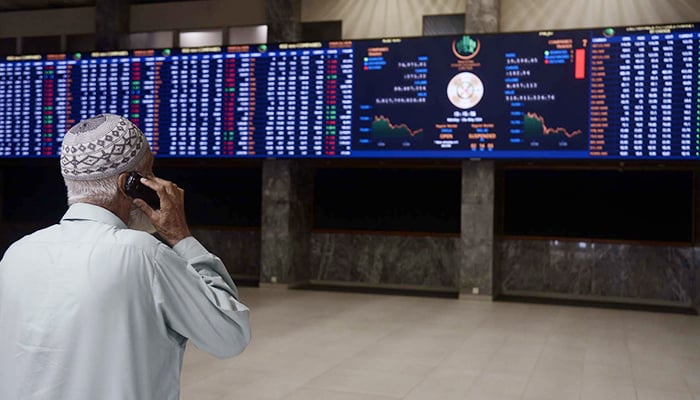Bulls take charge at PSX as stocks jump by over 3,200 points
"Market has increased as budget is expected to get Pakistan IMF [deal]," says analyst
June 13, 2024

KARACHI: Bulls took charge at the Pakistan Stock Exchange (PSX) on Thursday as the market witnessed a rise of more than 3,200 points, which analysts attribute to the government's willingness to unlock a deal with the International Monetary Fund (IMF) after the budget.
The federal government has set a challenging tax revenue target of Rs13 trillion for the next fiscal year, a nearly 40% jump from the current year, in the budget.
The benchmark KSE-100 index jumped by 3219.03 points or 4.42% during the intra-day trade to 76,016.46 points, up from the previous close of 72,797.43 points.
"The market has increased as the budget is expected to get Pakistan [the] IMF [deal]," Samiullah Tariq, the head of research at Pak-Kuwait Investment Company, told Geo.tv.
Tariq noted that alternate investment avenues have been taxed and the concerns related to tax on capital gains and dividends have "gone away with clarity on the budget".
Key objectives for the upcoming fiscal year include bringing the public debt-to-GDP ratio to sustainable levels and prioritising improvements in Pakistan's balance of payments position, the budget document showed.
Finance Minister Muhammad Aurangzeb, while presenting the budget, projected a sharp drop in the fiscal deficit for the new financial year to 5.9% of GDP, from an upwardly revised estimate of 7.4% for the current year.
The federal government will also look to widen the tax base to avoid burdening existing taxpayers to meet its targets, Aurangzeb said.
Pakistan is in talks with the lender for a loan of $6 billion to $8 billion, as it seeks to avert a default for an economy growing at the slowest pace in the region.
The rise in the tax target is made up of a 48% increase in direct taxes and 35% hike in indirect taxes over revised estimates of the current year. Non-tax revenue, including petroleum levies, is seen increasing by a whopping 64%.
Aurangzeb said sales tax would increase to 18% on textile and leather products as well as mobile phones. He also announced a hike in the tax on capital gains from real estate.
Raza Jafri, CEO at EFG Hermes Pakistan, said that the market is reacting positively to the soft changes to CGT for tax filers, in sharp contrast to the fears in the run-up to the budget.
"The measures to go after non-tax filers, and to an extent, retailers and real estate, are also being taken positively although risks remain on enforceability.
In its current form, it is a budget that should help secure an IMF program. The government now needs to stay firm and push through with implementation and enforcement," he added.









